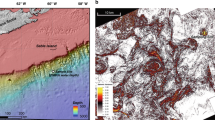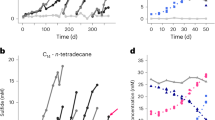Abstract
The potential for the biological conversion of long-chain saturated hydrocarbons to methane under anaerobic conditions has been demonstrated by using an enrichment culture of bacteria to degrade pure-phase hexadecane1. The formation of methane in hydrocarbon-rich subsurface zones could be explained if a similar conversion of long-chain alkanes to methane were to take place in subsurface environments. If this process could be stimulated in the subsurface, it could be used to enhance hydrocarbon recovery from petroleum reserves1,2. Parkes2, however, questions the environmental significance of the enrichment-culture results1 on the grounds that alkane conversion to methane is very slow and because sulphate-reducing and methanogenic bacteria might both be necessary for even this slow process to occur, restricting the conversion to specialized, unusual zones in sediments. Here we show that, on the contrary, subsurface bacteria can adapt to convert hexadecane to methane rapidly and in the absence of sulphate-reducing bacteria.
This is a preview of subscription content, access via your institution
Access options
Subscribe to this journal
Receive 51 print issues and online access
$199.00 per year
only $3.90 per issue
Buy this article
- Purchase on Springer Link
- Instant access to full article PDF
Prices may be subject to local taxes which are calculated during checkout

Similar content being viewed by others
References
Zengler, K., Richnow, H. H., Rosselo-Mora, R., Michaelis, W. & Widdel, F. Nature 401, 266–269 (1999).
Parkes, J. Nature 401, 217–218 (1999).
Lovley, D. R. & Chapelle, F. H. Rev. Geophys. 33, 365–381 (1995).
Anderson, R. T., Rooney-Varga, J. N., Gaw, C. V. & Lovley, D. R. Environ. Sci. Technol. 32, 1222–1229 (1998).
Ward, D. M., Atlas, R. M., Boehm, P. D. & Calder, J. A. Ambio 9, 277–283 (1980).
Ward, D. M. & Brock, T. D. Geomicrobiol. J. 1, 1–9 (1978).
Author information
Authors and Affiliations
Corresponding author
Rights and permissions
About this article
Cite this article
Anderson, R., Lovley, D. Hexadecane decay by methanogenesis. Nature 404, 722–723 (2000). https://doi.org/10.1038/35008145
Issue Date:
DOI: https://doi.org/10.1038/35008145
This article is cited by
-
A review on anaerobic microorganisms isolated from oil reservoirs
World Journal of Microbiology and Biotechnology (2021)
-
Oil reservoir simulating bioreactors: tools for understanding petroleum microbiology
Applied Microbiology and Biotechnology (2020)
-
Methanogenic biodegradation of crude oil storage tank sludge enhances bio-corrosion of mild steel
Euro-Mediterranean Journal for Environmental Integration (2018)
-
Cumulative effects of repeated chlorothalonil application on soil microbial activity and community in contrasting soils
Journal of Soils and Sediments (2016)
-
Anaerolineaceae and Methanosaeta turned to be the dominant microorganisms in alkanes-dependent methanogenic culture after long-term of incubation
AMB Express (2015)
Comments
By submitting a comment you agree to abide by our Terms and Community Guidelines. If you find something abusive or that does not comply with our terms or guidelines please flag it as inappropriate.



